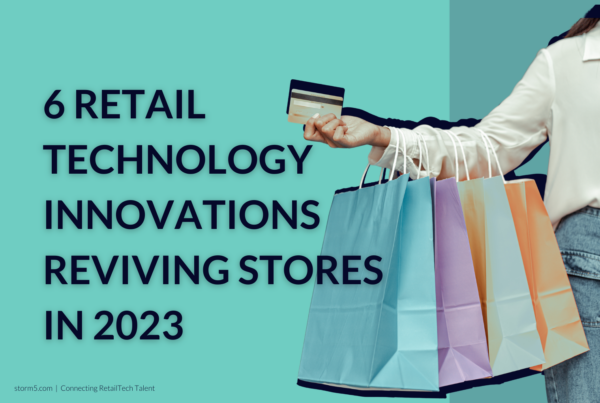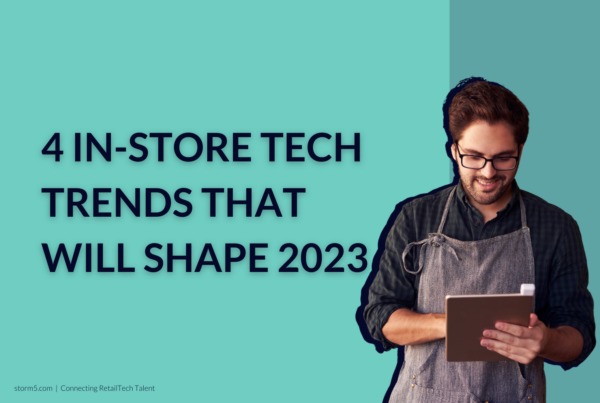Sustainability in Retail Technology
The rise of conscious consumers has driven businesses to rethink their sustainable strategies. A new understanding of the environmental impact of purchasing habits, as well…

The rise of conscious consumers has driven businesses to rethink their sustainable strategies. A new understanding of the environmental impact of purchasing habits, as well as a desire to learn the ethics and processes of the businesses they shop with, is a top priority.
Retailers must invest in sustainable initiatives to drive customer satisfaction, profitability and ultimately protect our planet. For example, Deloitte’s Millennial Survey 2020 found that for Millennials and Gen Z, climate change and protecting the environment remain the top challenges both before and after the pandemic. For these demographics, it’s equally important that the brands they support champion their values.
How tech innovation is making Retail go green
The sustainability problem in retail
Retailers, both brick-and-mortar and e-commerce, have benefited significantly from the market’s post-covid growth, as sales have increased. However, all actions have consequences. E-commerce, in particular, has proven to harm the environment, with online return rates contributing to landfills, carbon footprint, and increasing the amount of packaging used per order. Each year, up to £5 billion of returned goods end up in landfills, which is harmful to both retailers’ bottom lines and the environment.
Similarly, in-store shopping affects the environment. Modes of transportation have increased carbon emissions as consumers physically travel to the store. Another drawback of physical stores is that the buildings themselves waste a lot of energy. During the pandemic, three out of ten stores left their lights on when they were closed. Some retailers purposefully keep their stores lit up 24/7 to deter vandalism or theft; however, this wastes a great deal of energy.
A report by Garnier discovered that 73% of UK consumers want to be more sustainable in 2021. Another study found that nearly 60% of consumers are willing to change their shopping habits to reduce environmental impact. This shows that if retailers fail to make sustainability a priority, they risk losing their customer base. The key area of focus in retail sustainability is waste reduction. E-commerce retailers should focus on reducing return rates, while retailers with physical stores should concentrate on using sustainable alternatives.
Is technology the key to a green future?
Technology drives sustainable initiatives. Here are three popular technologies being used by retailers:
Not only does AI boost profits, but it also accelerates sustainability. Using AI to make decisions about environment-related areas could add more than $5 trillion to the global economy over the next decade.
To combat the rate of returns, retailers can use AI to analayze what stock is in demand, reducing waste and limiting journeys from distributors. AI ultimately helps companies make smarter production and purchase decisions.
- 3D modelling
A smart mannequin can alter its size within minutes to allow designers to personalize unique models on-demand. This technology reduces the need to create multiple prototypes, shortening lead times. On-demand manufacturing enables brands to quickly respond to changing consumer trends without being burdened with overstock.
- Smart lighting technology
Useful for retailers with physical stores, this type of lighting system is connected to the internet and can follow schedules effectively and be controlled from a remote location. For example, implementing motion-activated lights with sensors optimizes the use of energy by the lighting system depending upon the occupancy in the store.
Sustainability trends in retail

A circular economy aims to reshape growth by emphasizing positive societal outcomes. Companies are transitioning from a traditional manufacturing model to a circular supply chain to reduce energy consumption and environmental impact. This can be done by eliminating waste throughout the entire production chain or reusing packaging.
Green delivery is the most ethical mode of product transportation. Businesses should use greener service delivery technologies to minimize their carbon footprint, for example, combine deliveries or use electric vehicles. Companies that are more ecologically concerned will dispatch deliveries once capacity is full, reducing the number of trips and, as a result, contributing less to air pollution.
Sustainability is key for businesses, so implementing the right tech and having the right people to build your vision can assist in achieving your sustainable goals. We can connect you with our extensive network of top talent that will bring incredible experience to your organization. Get in touch to discuss your recruitment requirements!






